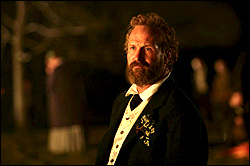They say, “Ask and ye shall receive” — well, that’s probably what they say in M. Night Shyamalan’s world, anyway, where everyone speaks Olde English even though we all know by now (don’t we?) that they’re really just 20th-century expatriates playing pilgrim on some wildlife preserve. In any case, a couple of weeks ago I requested that everyone who felt used by The Village write in and share the pain of paying $10 for Shyamalan’s William-Hurt-made-me-act-like-a-werewolf-so-we-could-all-have-a-happy-Thanksgiving summer blockbuster. Everyone shared, all right. I thought I was an angry little bastard, but you people were even more bitter.
“Did you read the crap that Mr. Shyamalan was spreading on reporters about The Village being Wuthering Heights meets King Kong?” fumed Gary, via e-mail.
Gary is referring to an interview in The Washington Post in which M. Night claimed he was inspired by those films and, further, that he hoped his movie “broke so many rules we created a new rule.” Yeah, job well done, M.-New Rule No. 1: M. Night Shyamalan is no longer allowed to write his own screenplays.
Ginny wanted to bemoan the performance of Bryce Dallas Howard, Ron Howard’s daughter, who was “10 times less convincing as a blind girl than Melissa Sue Anderson in Little House.” Ginny, please, you’re breaking Opie’s heart.
Paige swore the film came off “like some sort of ‘white-flight’ racist fantasy,” which, I’ll admit, is worth a whole other column. Signs was sanctimonious enough, but The Village does actually seem to suggest that dressing your children in vintage gear is simply the best way to keep the species pure.
A number of people reminded me that it is William Hurt’s apparently all-powerful family name on the wildlife preserve that keeps the village undisturbed; a simple “All Who Enter Here Will Be Forced to Endure Bill’s Speech Pattern” placard would have been just as efficient, as far as I’m concerned. Also, I was wrong when I said that the town elders all worked for the inner-city “Counseling Center” that they’re posed in front of in an old photo near the film’s climax. They’re actually grieving clients of the center. (Even better: “Hey, our relatives were all victims of urban crime! Say ‘Cheese’!”)
Mary, who compared the film to “watching a snail cross the 100 feet of my backyard, only to find a dog turd in its path,” thought the movie would have been better if it had ended with Howard marrying the security guard who finds her outside the enclave walls, then returning to unleash a pack of wild animals onto the preserve (I told you these people were bitter).
Eric, however, tried to remain calm and, following my request, came up with this thoughtful new explanation of the film’s high jinks: “It really is 1897. Each of the founders of the village was guilty of a vigilante murder of the person who killed their loved one. The deal they made with society was that they would never leave their isolated ‘village.’ It would explain why it was so vital to keep the second generation so terrified of the surroundings.”
Congratulations, Eric. You get first place from me and, if things keep up like this in Hollywood, a $15 million-a-movie contract. Go get ’em.








